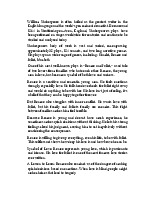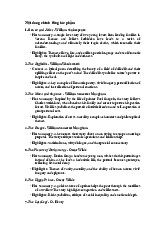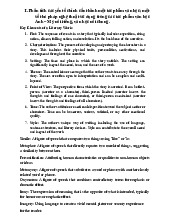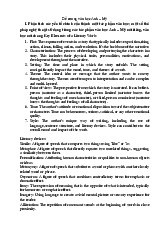





Preview text:
lOMoAR cPSD| 58950985
VĂN HỌC ANH MỸ - A2
1. Renaissance (End of the 15th century—Beginning of the 17th century)
The progressive ideology of the Renaissance was humanism. Human life, the
happiness of people, and his belief in man’s abilities became the main
subjects in the arts and literature. The works of humanists proclaimed equality
for people regardless of their social origin, race, and religion.
- These ideas were best expressed by the first English humanist, Thomas More
(1478–1535), in his book Utopia. Utopia is a story about an imaginary island
where all people are equal and free. Private property here has been replaced
by public ownership. Physical labor is combined with intellectual occupation.
Utopia had a great influence on the development of humanistic ideas in
England as well as in the whole of Europe. It was the first literary work that
conveyed the ideas of communism.
The middle of the 16th century and the beginning of the 17th century
witnessed the flourishing of English drama. Among the playwrights of the
period were John Lyly, Robert Greene, Christopher Marlowe, Ben Johnson,
and others. The most outstanding dramatist of the period, as well as the whole
time, was William Shakespeare with the famous tragedy Romeo and Juliet (1595).
2. Background of William Shakespeare (1564-1616) •
The great English playwright, poet, and actor lived during the Renaissance era. •
Known for his immense contribution to literature, with 2 poems, 154 sonnets,
and 37 plays, which are usually divided into 4 categories: histories, comedies,
tragedies, and romances, he explores human emotions and conflicts in a
captivating and insightful manner. lOMoAR cPSD| 58950985 •
Some of Shakespeare's most renowned plays include "Romeo and Juliet,"
"Hamlet," "Macbeth," "Othello," and "A Midsummer Night's Dream." •
WS’s greatness lies in the depths of his humanism. His art was highly
appreciated by Marx, Engels, Pushkin, and other great minds in humanity.
For about four centuries, WS has remained one of the best-known and
bestloved playwrights and poets in world literature. Every new generation of
people finds in his works some problems of particular interest. That is why WS
“belongs not to the century but to all times”.
3. Background of “ROMEO AND JULIET”
Is one of WS’s most famous tragedies, written in 1595. It is a play about love
and passion between two young people. It is also about the fate of the two
“star-crossed lovers,” who eventually take their own lives because of misunderstandings.
4. ROMEO’S CHARACTERISTICS a. Brave
Follow the endless love with Juliet, even though the two families are fiercely
opposed. Ignoring the danger, Romeo scaled the Capulet’s wall to be near
Juliet, the woman he cannot forget though he could be killed if discovered by
Juliet’s relatives. The image of the stone wall symbolizes the boudaries set by
their feuding families, the expectations of society that prevent Romeo and
Juliet from freely pursuing their love. Nevertheless, Romeo said that it was
the power of love that helped him overcome everything. b. Immature •
“Did my heart love till now? •
Forswear it, sight, forr I neve saw true beauty till this night.” lOMoAR cPSD| 58950985
This is the moment he saw Juliet; he completely forgot Rosaline, with whom
he had fallen in love before, so we can tell that he was not totally in love
with her but just infatuated with her physical beauty. Romeo seemed childish
and unaware of what real love is. •
He never took responsibility for his actions. Romeo was a big believer in fate;
like many people in the 16th century, he was always blaming the stars for his
wrong doings."O, I am a fortunes fool." After killing Tybalt and being
banished by the Prince of Verona, Romeo seemed very immature for not
accepting his bad actions that led him to this circumstance. c. Sociable
He was a good companion and got along well with most people. He was
especially close to Mercutio, Benvolio, and especially Friar Laurence, who
agreed to aid Romeo in his marrigae to end the long-running Montague and Capulet feud. d. Aggressive
Since Tybalt was Juliet's cousin, Romeo felt that fighting him would be wrong.
However, because Tybalt killed his close friend, Mercutio, Romeo killed
Tybat in revenge. Despite his aggressiveness and ferocity without considering
the consequences of his action, it showed the loyal friendship between Romeo and Mercutio. e. Faithfulness •
Since Romeo loved Juliet at first sight, he was wholeheartedly in love with
her, and the two decided to marry. He did everything to satisfy and comfort
his wife, even being willing to deny his own surname as she wished to have her love: •
“My name, dear saint, is hateful to myself.
Because it’s an enemy to you.
Had I written, I would tear the world apart. •
“Neither, fair saint, if either you dislike.” lOMoAR cPSD| 58950985 •
“And what love can do, that dares love attempt
Therefore ……” •
From Romeo’s perspective, Juliet was compared to the sun as well as “the
fairest star in all the heavens." They often planned to meet each other at night
while the fights between the Capulets and the Montagues took place during
the day. It was Juliet’s beauty that brightened up the night.
“It is the east, and Juliet is the sun!
Arise, fair sun, and kill the envious moon.”
This imagery highlights Juliet's beauty and suggests that she is the source of light
and guidance in Romeo's life. The references to stars also imply a sense of fate and destiny. •
On hearing that Juliet was dead, Romeo decided to risk his own life by
returning to Verona at once to see Juliet one last time. He also bought some
poison because he cannot live without his wife: “The I defy you, stars,” but
he had not known that it was just a plan of Juliet (falling asleep for long hours)
to escape with Romeo. When Romeo took his poison, kissed Juliet, and died,
it was too late for Friar Laurence to explain this plan. Here is more death and
confusion, driven by a misunderstanding and Romeo’s passions.
Conclusion: Romeo and Juliet's love ultimately resulted in tragedy, highlighting
the potential dangers of impulsive decisions and the importance of communication
and understanding in relationships. •
Despite the differences in time and cultural context, the emotions and desires
experienced by Romeo and Juliet are relatable to modern-day teenagers, who
also experience intense emotions and desires in their relationships. •
The story of Romeo and Juliet serves as a cautionary tale, reminding modern
youngsters to approach love with caution, mindful of the potential
consequences of impulsive actions. lOMoAR cPSD| 58950985
5. JULIET’S CHARACTERISTICS A, Obedient
Juliet was presented as quiet and obedient in earlier scenes; however, she
possessed an inner strength that enabled her to have maturity beyond her
years. When Capulet suggested that she marry Paris, Juliet said that she would
attempt to love Paris to make him happy.
b. Less sociable than Romeo
She had no friends her own age; she just stayed at home and talked with her
nurse, resulting in less interaction with society at that time. c. Clever •
She made all of the plans for the two to meet each other at night or even escape to another place. •
She stuck to Friar Laurence’s advice, which was to take a potion simulating
death so that Romeo could take her away from the wedding with Paris. •
Unlike other girls, Juliet was very special in terms of her strategies to appeal to Romeo. •
When Tybalt was killed by Romeo, in lieu of getting disappointed or
frustrated, Juliet was as cool as a cucumber to find out methods to calm down the serious affair.
d. Having a passion for loving Romeo •
Juliet falls immediately in love with Romeo when she meets him at her father’s party. •
Juliet's love for Romeo changes her character completely, from being innocent
to brave and mature. While being aware of the risks, Juliet is brave and open
about her feelings. She proposes getting married to Romeo. She's not afraid to
stand up to her parents when they force her to marry Paris. She was resolute lOMoAR cPSD| 58950985
in her decision to die rather than enter into a false marriage with Paris. At this
point, when Juliet was most isolated from her family,
even the nurse betrayed Juliet's trust by advising her to forget Romeo and
comply with her father's wishes.
Strong feelings, independence •
She fell in love with him, but then she realized that he was the son of her family’s feuding
→ She desperately wished he were not a Montague or she were not a Capulet so that
they could easily become a couple. She wanted Romeo to deny his family and ancestry.
“What’s Montague?
…………………….
What’s in a name?
………………………”
“Art thou not Romeo, and a Montague”
The audience also sees a genuine devotion to Romeo at the end of the play. The
moment when Juliet woke up from the friar Laurence's potion is one of the most
tragic points of the play. Romeo kills himself with poison because he thinks that
Juliet is dead, but actually, Juliet had taken a sleeping potion. When she awoke and
found that Romeo had been dead, she was so depressed and had no idea how to
escape from this pain. Without a second thought, she chose death over a life without
Rome by stabbing herself with his dagger.
She was strong enough to protect her endless love for Romeo and wanted to show
that she was not weak and sensitive but resolute and independent. At that time, only
the Duke was allowed to use swords, but Juliet ignored that rule to use a sword,
stabbing herself so that she and Romeo could be together in heaven.
Change the former motif, in which most girls at that time were timid and shy.



